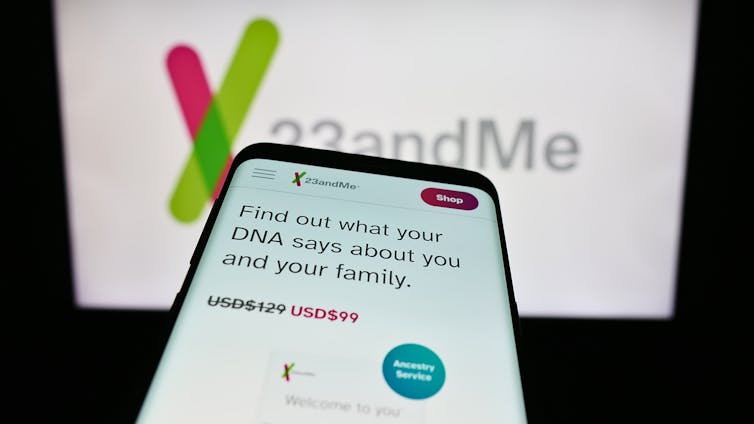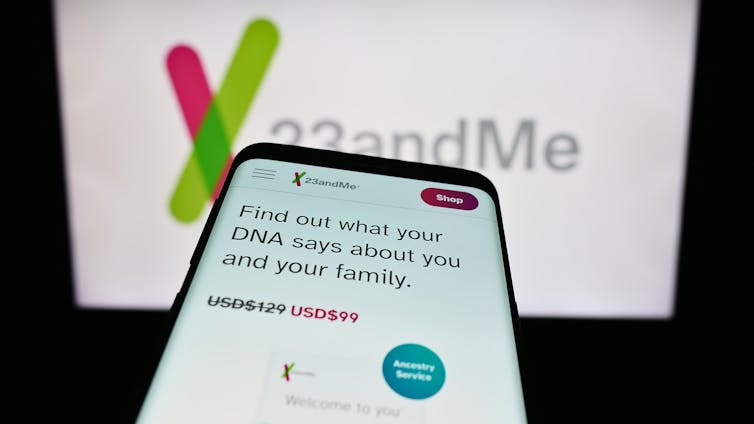Millions of People’s DNA Is in Doubt as 23andMe Faces Bankruptcy
Since its founding nearly two decades ago, 23andMe has grown into one of the largest biotechnology companies in the world. Millions of people have used their simple genetic testing service, which involves ordering a saliva test, spitting into a tube, and returning it to the company for a detailed DNA analysis.
But now the company is on the verge of bankruptcy. This has raised concerns about what will happen to the genetic material it contains.
The company’s chief executive, Anne Wojcicki, said she was committed to protecting customer privacy and would “maintain our current privacy policy”.
But what can 23andMe customers themselves do to ensure their genetic information is protected? And should we be concerned about other companies collecting our DNA?
What is 23andMe?
23andMe is one of the largest companies in the crowded market for consumer genetic testing. Founded in 2006 in California, it launched its spit test and Personal Genome Service the following year, with an initial cost of US $999. This test won Time magazine’s Invention of the Year in 2008.
Consumers took advantage of the urge to order saliva collection equipment online, spit into a tube and send it back. In a few weeks when the results were ready they could know about their health, ancestry, and other things like food choices, fear of public speaking and cheek dimples.
The price of test kits has dropped rapidly (now US$79). The company grew worldwide and in 2015 had 1 million customers. The firm went public in 2021 and initially the stock price rose. As of 2024, the company says 14 million people have taken a 23andMe DNA test.

23andMe brought excitement and investor interest to genetics. He was not alone. By 2022 the consumer genetic testing market was worth $3 billion. The three biggest players – 23andMe, AncestryDNA and MyHeritage – together hold the genetic information of about 50 million people worldwide.
There are many smaller players as well, some focusing on emerging markets such as MapMyGenome in India and 23mofang and WeGene in China.
What happened to 23andMe?
23andMe experienced a rapid decline after 2021 went public.
Its value has dropped by more than 97%. In 2023 it had a major data breach affecting nearly seven million users, and settled a class action lawsuit for $30 million.
Last month, seven of its independent directors resigned amid news that the original founder plans to take the company private again. The company has never made a profit and is reportedly on the verge of bankruptcy.
What this might mean for its vast genetic stores is unclear.
When people sign up for a 23andMe test the company assures them: “your privacy comes first”. It promises not to share people’s DNA with employers, insurance companies or public databases without permission.
It puts the choice in the hands of consumers about whether their saliva sample is stored by the company, and whether their anonymous genetics and other information is used in research. Four out of five people who bought a 23andMe survey agreed to have their data used in research.
However, if you dig deeper, it becomes clear that 23andMe uses personal data in a number of different ways, such as sharing it with service providers. Perhaps more importantly, if a company goes bankrupt or is sold, personal information can also be “accessed, sold or transferred”.
In a statement to The Conversation, a 23andMe spokesperson said Wojcicki “is not open to considering third-party takeover offers”, and that if there is any future change, existing confidentiality agreements will company and customers “will remain in place unless there is a future change. and until customers are presented with, and agree to, new terms and conditions – and only after receiving proper notification of any new terms, under applicable data protection laws”.
Tips for people to protect their genetic information
With 23andMe prominent, people may want to take steps to protect their genetic information (although experts say there’s no more risk than it’s ever been).
The easiest thing is to delete your account, which excludes you from future research and discards your saliva sample. But if your data has already been selected and used in research, it will not be found. Even if you delete your account, 23andMe says it will retain information, including genetic information, date of birth and sex, to comply with its legal obligations.
Buying a DNA test online may sound fun and rewarding and it has certainly been marketed that way. There are many good stories about how getting test results has helped people connect with lost families or understand more about their life’s risks. People just need to buy tests with their eyes open as to what this could mean.
First, the results may not all be positive. Knowing about health risks without the guidance of a health professional can be scary. Finding out that the person you thought was your mother or father is not, is the result of one in 20 people buying a DNA test online.
Second, every company that sells DNA tests does so with many legal conditions attached. People click on these without a second thought but researchers have shown it’s worth taking a closer look. Think about what the company says about what they will do with your data and your sample, how long they will keep it, who else can access it, and how easy it will be to access it. cancel later.
There are guidelines from organizations such as Australian Genomics that can help. Also remember that if the company holding your DNA profile is sold, it can be difficult to ensure that the data is protected.
So maybe reconsider giving a DNA test as a Christmas present.![]()
Megan PrictorSenior Lecturer in Law, University of Melbourne
This article is reprinted from The Conversation under a Creative Commons license. Read the first article.
#Millions #Peoples #DNA #Doubt #23andMe #Faces #Bankruptcy
